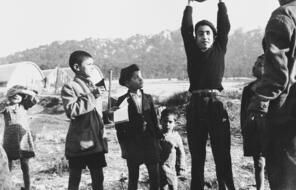Shifts in Power and Antisemitic Legislation in North Africa from Colonialism through WWII
At a Glance
Language
English — USSubject
- History
- Social Studies
- The Holocaust
- Antisemitism
1830
France forcibly occupied Algeria and established colonial rule
1870
The Cremieux Decree was passed in Algeria, which granted French citizenship to most Algerian Jews
1881
France forcibly occupied Tunisia and established colonial rule
1911
Italy forcibly occupied Libya and established colonial rule
1912
France forcibly occupied Morocco and established colonial rule
1
1922
Benito Mussolini was appointed Prime Minister of Italy, and, in the course of the next seven years, he consolidated power to form a fascist state
1933
Hitler was appointed Chancellor of Germany
1935
Nuremberg Race Laws were passed in Germany, restricting German citizenship to those who were “racially pure” as well as outlawing intermarriage or sexual relations between Jews and “people of German or related blood.” In the years that followed, Germany passed many more antisemitic laws.
1936
Nazi Germany and Fascist Italy signed a treaty of cooperation
1938
Antisemitic “Race Protection Laws” passed in Italy and were instituted in Libya
1939
Germany invaded Poland, beginning WWII
1940
In June, France surrendered to Germany, and Germany occupied the northern part of the country. The pro-Nazi Vichy government of Philippe Pétain governed the southern part of France, Algeria (which had been claimed as part of France), as well as Morocco and Tunisia, which had been claimed as French protectorates.
In September, Italy attacked British-controlled Egypt from Italian-controlled Libya and was driven back by the British.
In October, France passed antisemitic racial laws and the Cremieux Decree was abolished, taking French citizenship away from Algerian Jews. 2
1941
In February, German troops reinforced Italians in Libya to drive out the British, and territory in Libya continued to go back and forth between British and German control until January 1943.
1942
On November 8, “Operation Torch” began with the Allied landing in Morocco and Algeria as the Allies fought to take control of North Africa and force out the Axis powers.
On November 10-11, Vichy leaders in North Africa ordered French forces to cease armed resistance, and French forces in North Africa joined the Allies, prompting Hitler to occupy Vichy France and Tunisia. 3
1943
In January, the British drove the Germans out of Libya.
In March, Vichy racial laws were repealed, but the Cremieux Decree remained overturned.
On May 7, the British captured Tunis, the capital of Tunisia, and U.S. forces captured the last port controlled by the Axis powers.
On May 13, Axis forces in North Africa surrendered, and the war continued for two more years as the Allies advanced towards Germany and Japan.
1945
WWII came to an end with Germany’s surrender to the Allies on May 8 and Japan’s surrender on September 2.
- 1Spain also forcibly occupied parts of Morocco in the same year.
- 2Additional antisemitic laws were passed by France in 1941 and implemented to varying degrees across French-controlled North Africa.
- 3The Allied victory in North Africa did not mean the end of antisemitic legislation due to the fact that many of the Vichy administrators were left in power as part of a negotiated deal for the French forces in North Africa to join the Allies. Up until mid-March 1943, the French authorities refused to consider any change to the Vichy laws, and then the laws were repealed with pressure from Jewish organizations in North Africa and the United States. The Cremieux decree was not reinstated until October 1943, when a French government opposed to the Vichy administration took that step.













